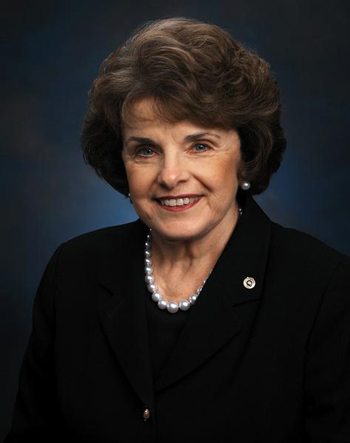October 30, 2021 - Washington - Senator Dianne Feinstein (D-Calif.) joined Senator Brian Schatz (D-Hawaii) and a group of their colleagues to call on Federal Bureau of Prisons (BOP) Director  Michael Carvajal to reverse the previous administration’s harmful BOP policy which increased transgender prisoners’ risk of sexual victimization.
Michael Carvajal to reverse the previous administration’s harmful BOP policy which increased transgender prisoners’ risk of sexual victimization.
“In 2018, BOP made substantive revisions to the Transgender Offender Manual (the Manual) that placed incarcerated transgender people at serious risk of sexual victimization by making it more difficult, if not impossible, to house incarcerated transgender people in facilities in accordance with their gender identity,” the senators wrote in a letter to BOP Director Carvajal. “We strongly urge the BOP to reverse the previous administration’s policy and to consult with incarcerated transgender people and the legal, policy, and advocacy organizations who represent their interests before issuing a final revision of the Manual to develop a policy that is consistent with existing law and responsive to the needs of incarcerated transgender people.”
According to a survey by the National Center on Transgender Equality, transgender people are ten-times more likely to be sexual assaulted in prison, and five-times more likely to be sexually assaulted by prison staff.
In addition to Feinstein and Schatz, the letter was also signed by Senators Elizabeth Warren (D-Mass.), Tammy Baldwin (D-Wis.), Ed Markey (D-Mass.), Patty Murray (D-Wash.), Bernie Sanders (I-Vt.), Kirsten Gillibrand (D-N.Y.) and Cory Booker (D-N.J.).
Full text of the letter is available here and below:
Dear Director Carvajal:
We write to urge you to reverse the Federal Bureau of Prisons’ (BOP) harmful policy toward transgender people made by the previous administration. In 2018, BOP made substantive revisions to the Transgender Offender Manual (the Manual) that placed incarcerated transgender people at serious risk of sexual victimization by making it more difficult, if not impossible, to house incarcerated transgender people in facilities in accordance with their gender identity.
The most egregious change made to the revision was to import the novel and undefined term “biological sex” into the policy as the initial consideration when making housing and programming assignments. But the term “biological sex” is an imprecise term that is often used to redefine “sex” to exclude transgender people from legal protections and considerations. The term is not defined in the Manual or defined or supported by federal law. In fact, the modifier “biological” is inconsistent with existing federal law. For example, the standards established under the Prison Rape Elimination Act requires prison officials to make a genuine, individual, case-by-case assessment of whether a transgender person is most safely and appropriately housed with members of their own, self-identified gender. The law also forbids the dangerous practice of automatically segregating transgender people. Yet the revisions to the Manual made designating individuals to a facility based on their gender identity “appropriate only in rare cases.”
In response to the revisions, a group of senators wrote to the BOP in 2018 to express concerns in light of the alarming rates of sexual victimization incarcerated transgender people experience. According to data collected by the U.S. Department of Justice (DOJ), a staggering 40% of incarcerated transgender people experience sexual abuse each year. The letter requested evidence demonstrating the justification for the changes, clarification regarding why these changes do not undermine the BOP’s goal of ending sexual victimization, and an explanation of why the changes do not conflict with the BOP’s obligations under federal law and the U.S. Constitution.
The BOP responded by dismissively asserting—despite the DOJ data—that they have no statistical data regarding the risk of harm to incarcerated transgender people. The BOP then speculated that housing transgender people with non-transgender people could “disrupt the orderly operation of the facility” and that housing transgender prisoners in accordance with their gender identity could “create a risk of harm” when non-transgender prisoners oppose their placement. The BOP’s disregard for the serious risks of sexual victimization incarcerated transgender people experience and BOP’s prioritization of the discomfort of non-transgender people are revealing and disquieting.
Unfortunately, the 2018 changes to the Manual remain in place. Therefore, we strongly urge the BOP to reverse the previous administration’s policy and to consult with incarcerated transgender people and the legal, policy, and advocacy organizations who represent their interests before issuing a final revision of the Manual, to develop a policy that is consistent with existing law and responsive to the needs of incarcerated transgender people. Such consultation will prove helpful in reducing the rate of sexual victimization in federal prisons and will help ensure that transgender people are housed appropriately and based on their individual needs.
We applaud the Biden Administration’s commitment to ensuring that LGBTQ people experience equal treatment under the law, and we thank you for your prompt attention to this important matter. We look forward to your written response.
Sincerely,
Source: Senator Dianne Feinstein








